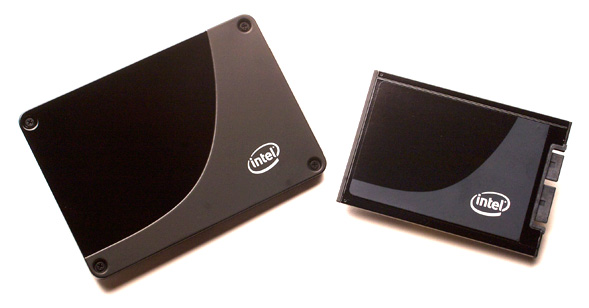Intel Phasing Out SSDs with 50nm Flash
It's time for the first generation of Intel SSDs to retire and be sent out to the pasture.
X-bit Labs reports that Intel plans to discontinue its 1st-generaton of solid state drives manufactured under the 50nm process: the X25-M and the X18-M. While the site doesn't provide a source, we assume the announcement was made this week during the International Electron Devices Meeting (IEDM) where Intel disclosed the secrets behind its 34nm process technology.
As it stands, the first-generation SSDs--the 50nm X25-M and X18-M offering 80 GB and 160 GB capacities--will be discontinued. Additionally, orders for the drives will no longer be accepted, and they will not be cancellable after April 20, 2010. Intel expects to ship the final batch of first-generation SSDs in August 2010.
The 50nm X25-M and X18-M originally appeared on the market in August 2008. Consumers didn't have to wait long for a successor, however: Intel's second-generation batch was released in late July 2009. It's estimated that the product life for a SSD model is a little over a year, shorter than the lifespan of CPUs.
This week at IEDM, Intel revealed its 2nd generation high-k/metal gate transistors that offer better performance than resistors used last year. The company said that performance has been boosted by 5-percent and 13-percent for NMOS and PMOS, respectively. Intel also revealed that SRAM array density, at 4.2 Mbit/mm2, is the highest reported array density for a 34nm or 28nm technology.
Get Tom's Hardware's best news and in-depth reviews, straight to your inbox.

Kevin Parrish has over a decade of experience as a writer, editor, and product tester. His work focused on computer hardware, networking equipment, smartphones, tablets, gaming consoles, and other internet-connected devices. His work has appeared in Tom's Hardware, Tom's Guide, Maximum PC, Digital Trends, Android Authority, How-To Geek, Lifewire, and others.
-
Nice to know that when I finally do decide to get an SSD, it'll be better than the 1st generation SSDs :)Reply
-
mlopinto2k1 THAT is why I don't buy new TECHONOLOGY. Ugggh! Could you imagine! Anyway, Kudos to Intel for furthering the technology.Reply
http://professionalmike.com
-
philologos Intel, please come out with second generation "E" class drives. Don't bury SLC flash. And another thing, I hate how they were labeled "enterprise" class. That's just bad marketing - discouraging home users from purchasing them. They will fly in a desktop just like a server. The same thing bothers me about Xeon processors and ECC memory.Reply
At least there's always OCZ Agility/Vertex EX keeping SLC alive -
kamel5547 philologosIntel, please come out with second generation "E" class drives. Don't bury SLC flash. And another thing, I hate how they were labeled "enterprise" class. That's just bad marketing - discouraging home users from purchasing them. They will fly in a desktop just like a server. The same thing bothers me about Xeon processors and ECC memory.At least there's always OCZ Agility/Vertex EX keeping SLC aliveReply
Actually I think in all cases (slc,xeon, ecc memory) price discourages the consumer more than anything.
As far as all three most consumers have little to gain (and really other than multi-P boxes who needs a Xeon?) from any of these technologies. Really SLC offers a limited return if only one person is accessing the drive. Xeon's offer no benefit IMHO(sure the extra valadation is nice CYA if you are running a critical server but in reality the nosebleed price gives you equivalent performance of consumer models with the exception of multi-P configurations. ECC pretty much falls into the same category.
-
Deadfred I'm looking forward to the large capacity SSD's with much lower $$ per GB price point than today. My experience with drives larger that 1TB is about 50% are DOA (or fail within a month). I'm hoping that SSD tech will not only give us great performance, but a much more reliable drive.Reply -
liquidsnake718 Next year will be worth the wait for SSD prices to drop, that will be the year for SSDs to become mainstream finally hitting prices at arounf $150 for mainstream >100gb SSDs....Reply
